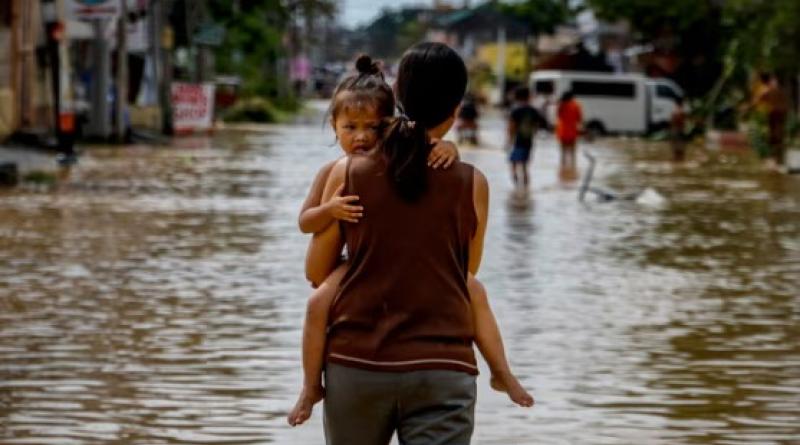Stop locking young people out of legal process in climate cases, say experts

Children are particularly vulnerable to climate crisis yet have little say politically or legally in most of world
Young climate activists should be able to fully take part in legal cases that affect them, say campaigners.
As governments and organisations around the world submit formal comments on climate breakdown to the world’s top courts, experts have condemned children’s inability to fully participate in the legal process in almost all jurisdictions.
Young people are particularly vulnerable to the climate crisis. At least 43 million child displacements were linked to extreme weather events over the past six years.
Even for those not on the frontlines, the issue is a widespread cause of chronic anxiety. Britain’s most senior paediatrician recently said the climate crisis posed an “existential risk” to the health and wellbeing of all children.
In response to this, and their inability to influence the political system by voting, young people are increasingly involved in various forms of climate activism.
Children have the right to sue governments over climate change and other environmental threats, a UN rights body recently said. However, the Committee on the Rights of the Child (CRC) still found significant barriers for young people to make claims and fully participate in the legal process.
This issue has come to the fore as part of requests for advisory opinions on the climate crisis brought before three influential international courts.
Although two babies joined their mothers during a recent hearing of the international tribunal for the law of the sea in Hamburg, formal evidence was not accepted from a number of organisations representing young people and the environment.
Kelly Matheson, the deputy director of global climate litigation at the US nonprofit law firm Our Children’s Trust, said she had tried to submit a briefing on behalf of 24 young people late on a Friday afternoon but by midday on Monday it had been rejected.
Theinternational court of justice, which was also recently tasked with providing an opinion on the climate crisis, is even more restrictive about the evidence it will accept; even the Pacific Island students who led the request cannot directly participate.
As a result, the students have produced a handbook urging governments to involve “young change-makers” actively working on climate injustice in preparing written and oral submissions to the court. They are also looking into whether they can attach annexes to state submissions.
By contrast, the inter-American court of human rights, which has been tasked with providing a similar opinion on the climate crisis, is much more open. It allows written submissions from individuals and young people are expected to take part.
Ashfaq Khalfan, the director of climate justice at Oxfam America, said litigation was expensive and difficult for everyone, but for young people it was even tougher. “Any failure to ensure access to remedy is a judicial responsibility,” said Khalfan, who has helped write interventions in several legal climate cases.
Ann Skelton, a professor of law at the University of Pretoria and chair of the CRC, said minors were presumed to lack legal capacity, so needed permission from their parents. She said it was also assumed that it took lawyers more effort to translate tricky legal concepts to young people in a language they understood than it did explaining them to an adult.
Furthermore, Skelton said, children were often not taken seriously. “There’s a reasonable acceptance that children can express their views nowadays – at least in some countries – but whether or not their views have to be given any weight is a separate question. In many countries, child participation amounts to little more than kindly listening.”
Some have, however, managed to state their case. Six young people from Portugal brought a lawsuit against 32 countries to the European court of human rights recently in which they described the physical and psychological effects that forest fires and the knowledge of the future effects of the climate emergency had on their lives. They forced 32 countries to send lawyers to court to defend themselves.
A court in Montana in the US heard testimony from a group of young people who argued their state had violated their right to a healthy environment. Led by 22-year-old Rikki Held, who described the dramatic changes she had already seen on her family ranch, they subsequently won their case.
Matheson said Montana was a perfect example of how things should be done. “Not only were their stories told in the court documents leading up to the case, but the young people were allowed to attend the hearing, and they were allowed meaningful participation. They were allowed to take the stand and, under oath, talk about how climate was affecting them. And say this to not only the judge – the decision-maker – but say it to the world.”
The next US youth-led climate case is due to go to trial in Hawaii in June and young plaintiffs will again take the stand.
Excluding young people from the world’s top courts on an existential threat to humanity breaches the fundamental principle of access to justice, said Matheson. “The courts have the power to allow other voices into the process, and they’re not taking it.”
Skelton said there was a greater need for young people to have access to the judicial system because they could not take part in the political one. “Because children can’t vote then it is more reasonable that they should be able to bring about change using whatever civic means may be available to them. And litigation – though difficult – is available to them, so there should be less of an objection to them engaging in it,” she said.
Photograph: Ezra Acayan/Getty Image - A woman carries her child through flood water after a typhoon battered parts of the Philippines last year





